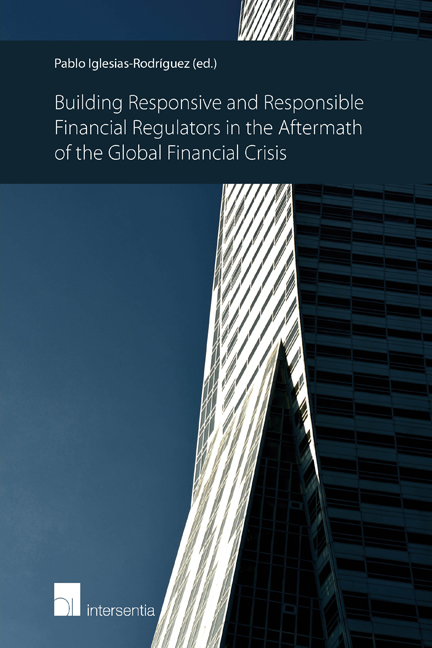Book contents
- Frontmatter
- Preface and acknowledgements
- Foreword
- Contents
- List of contributors
- Responsive-and-responsible financial regulation in the aftermath of the global financial crisis
- Part I THE CONTRIBUTION OF ACCOUNTABILITY, INDEPENDENCE AND ECONOMIC THEORY TO RESPONSIVE-AND-RESPONSIBLE FINANCIAL REGULATION
- Part II POST-CRISIS ARCHITECTURES OF FINANCIAL REGULATION IN THE EUROPEAN UNION, THE UNITED STATES OF AMERICA AND CANADA: ACCOUNTABILITY AND RESPONSIVENESSAND- RESPONSIBILITY
- Part II. 1 THE EUROPEAN UNION
- Part II. 2 THE UNITED STATES OF AMERICA
- Part II. 3 CANADA
Responsive-and-responsible financial regulation in the aftermath of the global financial crisis
Published online by Cambridge University Press: 26 November 2017
- Frontmatter
- Preface and acknowledgements
- Foreword
- Contents
- List of contributors
- Responsive-and-responsible financial regulation in the aftermath of the global financial crisis
- Part I THE CONTRIBUTION OF ACCOUNTABILITY, INDEPENDENCE AND ECONOMIC THEORY TO RESPONSIVE-AND-RESPONSIBLE FINANCIAL REGULATION
- Part II POST-CRISIS ARCHITECTURES OF FINANCIAL REGULATION IN THE EUROPEAN UNION, THE UNITED STATES OF AMERICA AND CANADA: ACCOUNTABILITY AND RESPONSIVENESSAND- RESPONSIBILITY
- Part II. 1 THE EUROPEAN UNION
- Part II. 2 THE UNITED STATES OF AMERICA
- Part II. 3 CANADA
Summary
INTRODUCTION
The global financial crisis that started in the year 2007 sparked several policy and academic debates about the role that Financial Regulation and Supervision Authorities (FRSAs) – the entities entrusted with the regulation and supervision of financial markets and institutions – played in the crisis and, notably, whether, how and why their actions or inactions contributed to the financial meltdown.
The post-crisis analyses concerning the regulatory and supervisory performance of FRSAs in the years preceding the financial collapse evidenced several failures of FRSAs in the carrying out of their obligations. In some instances, FRSAs performed their duties inappropriately or even negligently by failing to adequately identify and stop financial behaviours and practices that caused harm to consumers of financial services and, ultimately, to the financial system. More generally, it has been claimed that before the crisis FRSAs in countries that were later hit by the crunch followed regulatory and supervisory approaches that acknowledged above all the interest of the financial industry on the one hand, and dismissed to a great extent the objective of financial stability and the interest of the general investing public on the other.
The post-crisis institutional and legal reform-agendas in countries that were severely hit by the crisis have indeed encompassed important changes in the design, governance and organisation of FRSAs. The reforms introduced by the Dodd-Frank Act in the United States of America (US) supervisory institutional framework, the Regulations setting the European Supervisory Authorities in the financial field at the European Union (EU) level as well as the overhaul of financial supervision architectures in jurisdictions with highly sophisticated financial markets – e.g. the creation of the Prudential Regulation Authority and the Financial Conduct Authority in the United Kingdom (UK) – are all examples of this regulatory impetus tackling the functioning of FRSAs and aimed at overcoming some of the shortcomings of the previous regimes.
One of the common elements of the abovementioned post-crisis reforms is that they have brought about profound changes in the accountability of FRSAs and, in consequence, in the way in which they relate to their main account principals, namely political forums and stakeholders in the financial realm.
- Type
- Chapter
- Information
- Building Responsive and Responsible Financial Regulators in the Aftermath of the Global Financial Crisis , pp. 1 - 28Publisher: IntersentiaPrint publication year: 2015



